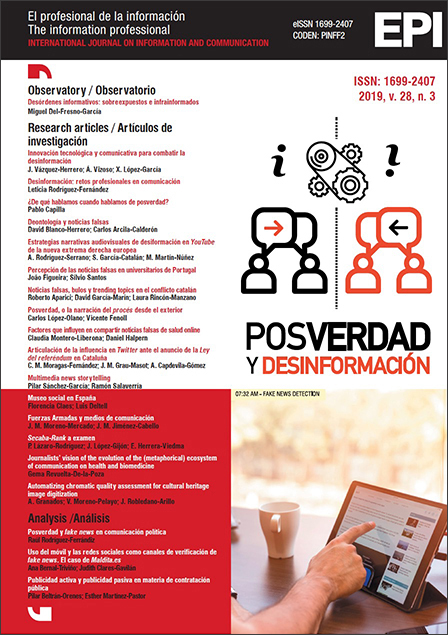What do we talk about when we talk about post-truth? Analysis of the term in seven quality journals
DOI:
https://doi.org/10.3145/epi.2019.may.09Keywords:
Post-truth, Political communication, Journalism, Newspapers, Social networks, Cognitive biases, Epistemology, Postmodernism, Donald Trump.Abstract
The use of "post-truth" has normalized as a way to conceptualize political and social phenomena considered new, as the election of Donald Trump or the Brexit. Despite this widespread use of the term "post-truth", it is still a concept with little concrete meaning. This research focuses on this problem, analysing the uses that seven media have made of "post-truth" during 2017: The New York Times, The guardian, The times, Le monde, Le figaro, El país and ABC. 151 articles have been analysed, those in which the use of "post-truth" provided some clue to establish a meaning. The research provides two conclusions: (a) post-truth is a concept of political communication that serves to characterize a change in the relationship that society has with the truth; (b) it is a term with a political bias that is used to designate an opponent who is perceived as an enemy of the society model.
Downloads
References
Arrieta-Kenna, Ruairí (2016). "These are the only 6 newspapers in the country to endorse Donald Trump". Politico magazine, October 25th. https://www.politico.com/magazine/story/2016/10/donald-trump-newspaper-endorsements-214390
Bakir, Vian; McStay, Andrew (2018). "Fake news and the economy of emotions". Digital journalism, v. 6, n. 2, pp. 154-175. https://doi.org/10.1080/21670811.2017.1345645
Carrera, Pilar (2018). "Estratagemas de la posverdad". Revista latina de comunicación social, n. 73, pp. 1469-1482. https://doi.org/10.4185/RLCS-2018-1317
D´Ancona, Matthew (2017). Post truth. The new war on truth and how to fight back. Londres: Ebury Press. ISBN: 978 1 785036873
Dubois, Elizabeth; Blank, Grant (2018). "The echo chamber is overstated: The moderating effect of political interest and diverse media". Information, communication & society, v. 21, n. 5, pp. 729-745. https://doi.org/10.1080/1369118X.2018.1428656
Durandin, Guy (1993). L´information, la désinformation et la réalité. Paris: Presses Universitaires de France. ISBN: 2 13 045475 5
European Commission (2015). A multi-dimensional approach to disinformation. Luxemburg: Publications Office of the European Union. https://publications.europa.eu/en/publication-detail/-/publication/6ef4df8b-4cea-11e8-be1d-01aa75ed71a1
Fí¼rsich, Elfriede (2009). "In defense of textual analysis. Restoring a challenged method for journalism and media studies". Journalism studies, v. 10, n. 2, pp. 238-252. https://doi.org/10.1080/14616700802374050
Hallin, Daniel C.; Mancini, Paolo (2004). Sistemas mediáticos comparados. Tres modelos de relación entre los medios de comunicación y la política. Barcelona: Editorial Hacer. ISBN: 978 84 96913127
Hearns-Branaman, Jesse-Owen (2016). Journalism and the philosophy of truth. Beyond objectivity and balance. New York: Routledge. ISBN: 978 1 138887459
Hsieh, Hsiu-Fang; Shannon, Sarah E. (2005). "Three approaches to qualitative content analysis". Qualitative health research, v. 15, n. 9, pp. 1277-1288. https://doi.org/10.1177/1049732305276687
Ibáñez, Jordi (ed.) (2017). En la era de la posverdad. 14 ensayos. Barcelona: Calambur. ISBN: 978 84 8394179
Jacquard, Roland (1986). La guerre du mensonge. Histoire secrète de la désinformation. Paris: Librairie Plon. ISBN: 978 2 259015219
Keyes, Ralph (2004). The post-truth era: Dishonesty and deception in contemporary life. New York: St. Martin´s Press. ISBN: 978 0 212306489
Lacy, Stephen; Rosenstiel, Tom (2015). Defining and measuring quality journalism. Rutgers School of Communication and Information. http://mpii.rutgers.edu/wp-content/uploads/sites/129/2015/04/Defining-and-Measuring-Quality-Journalism.pdf
Lewandowsky, Stephan; Ecker, Ullrich K. H.; Cook, John (2017). "Beyond misinformation: Understanding and coping with the "˜post-truth´ era". Journal of applied research in memory and cognition, v. 6, n. 4, pp. 353-369. https://doi.org/10.1016/j.jarmac.2017.07.008
Manjoo, Farhad (2008). True enough: Learning to live in a post-fact society. Hoboken (NJ): Wiley. ISBN: 978 1 620458303
Maras, Steven (2013). Objectivity in journalism. Cambridge: Polity Press. ISBN: 978 0 745663920
Martínez-Nicolás, Manuel (2015). "Investigar las culturas periodísticas. Propuesta teórica y aplicación al estudio del periodismo político en España". Revista internacional de comunicación y desarrollo, v. 1, pp. 151-162. http://www.usc.es/revistas/index.php/ricd/article/view/2177
Muñoz-Torres, Juan-Ramón (2012). "Truth and objectivity in journalism. Anatomy of an endless misunderstanding". Journalism studies, v. 13, n. 4, pp. 566-582. https://doi.org/10.1080/1461670X.2012.662401
McIntyre, Lee (2018). Post-truth. Cambridge/London: The MIT Press. ISBN: 978 0 262535045
Oxford Dictionaries (2016). "Oxford dictionaries. Word of the year 2016 is"¦ Post-truth". https://www.oxforddictionaries.com/press/news/2016/12/11/WOTY-16
Ruiz-Caballero, Carlos-Miguel (2015). La digitalización del otro. Los retos de la democracia en la era del ciberespacio. Lérida: Editorial Milenio. ISBN: 978 84 97437028
Schiller, Herbert (1973). Mind managers. Boston: Beacon Press. ISBN: 978 0 807005071
Waisbord, Silvio (2018). "Truth is what happens to news. On journalism, fake news, and post-truth". Journalism studies, v. 19, n. 13. https://doi.org/10.1080/1461670X.2018.1492881
Downloads
Published
How to Cite
Issue
Section
License
Dissemination conditions of the articles once they are published
Authors can freely disseminate their articles on websites, social networks and repositories
However, the following conditions must be respected:
- Only the editorial version should be made public. Please do not publish preprints, postprints or proofs.
- Along with this copy, a specific mention of the publication in which the text has appeared must be included, also adding a clickable link to the URL: http://www.profesionaldelainformacion.com
- Only the final editorial version should be made public. Please do not publish preprints, postprints or proofs.
- Along with that copy, a specific mention of the publication in which the text has appeared must be included, also adding a clickable link to the URL: http://revista.profesionaldelainformacion.com
Profesional de la información journal offers the articles in open access with a Creative Commons BY license.




